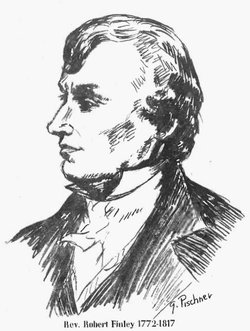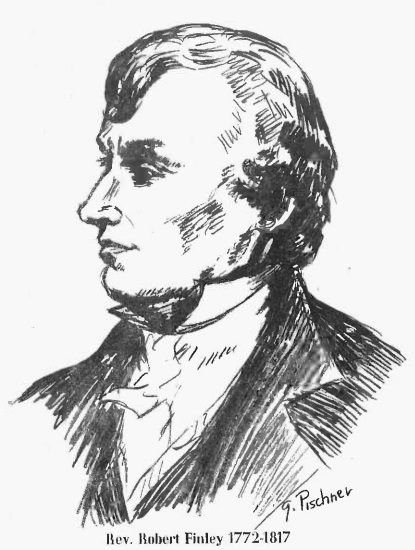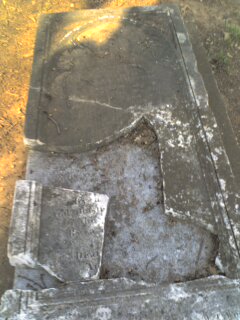Robert Finley entered the College of New Jersey at the age of 11 and graduated in 1787. He taught at several places, including Charleston, South Carolina, where many slaves existed. The Presbytery of New Brunswick, New Jersey licensed him as a minister in 1794. Finley returned to Princeton in 1793 to study Theology, and served as a tutor, eventually becoming a trustee of the university from 1806 until his resignation in 1817. In 1795, he was ordained as the Pastor of the Presbyterian Church at Basking Ridge, where he served for 20 years as a popular preacher and noted educator, and originated the concept of the modern Sunday School curriculum.
Finley taught at the Princeton University Grammar School;[2] and at the Basking Ridge, New Jersey Classical School (Brick Academy), serving there from 1795 until his acceptance of the University of Georgia (UGA) presidency in July, 1817.
In 1795, Dr. Robert Finley, re-established the private academy, known as the Basking Ridge Classical School, conducting classes first at the Presbyterian parsonage and then in a new frame school building erected near the church. In 1809, with enrollment expanding, Finley organized financing and construction of a new two-story brick building prominently located in the center of the village of Basking Ridge (Brick Academy).
Boys from the local area and from far away places like Virginia and New York City attended this exclusive school and most were given a classical education in preparation to enter the College of New Jersey (later renamed Princeton University). Students boarded with Dr. Finley and other local residents. Two buildings still standing near the Brick Academy were later used as dormitories.
Dr. Finley and Samuel John Mills helped organize the National Colonization Society of America and the American Colonization Society at Washington, D.C. in 1816 and 1817. Contributions were solicited from many contemporaries, including former students such as Charles Muir Campbell.
Finley fell ill while traveling south to assume his new position at the University of Georgia. He died only three months after arriving and is buried in Jackson Street Cemetery on the school's north campus in Athens, Georgia."
Contributed by: Michael Duffy
Rev. Robert Finley as a cenotaph in Oconee Hill Cemetery Athens, Clarke Co., GE
Robert Finley entered the College of New Jersey at the age of 11 and graduated in 1787. He taught at several places, including Charleston, South Carolina, where many slaves existed. The Presbytery of New Brunswick, New Jersey licensed him as a minister in 1794. Finley returned to Princeton in 1793 to study Theology, and served as a tutor, eventually becoming a trustee of the university from 1806 until his resignation in 1817. In 1795, he was ordained as the Pastor of the Presbyterian Church at Basking Ridge, where he served for 20 years as a popular preacher and noted educator, and originated the concept of the modern Sunday School curriculum.
Finley taught at the Princeton University Grammar School;[2] and at the Basking Ridge, New Jersey Classical School (Brick Academy), serving there from 1795 until his acceptance of the University of Georgia (UGA) presidency in July, 1817.
In 1795, Dr. Robert Finley, re-established the private academy, known as the Basking Ridge Classical School, conducting classes first at the Presbyterian parsonage and then in a new frame school building erected near the church. In 1809, with enrollment expanding, Finley organized financing and construction of a new two-story brick building prominently located in the center of the village of Basking Ridge (Brick Academy).
Boys from the local area and from far away places like Virginia and New York City attended this exclusive school and most were given a classical education in preparation to enter the College of New Jersey (later renamed Princeton University). Students boarded with Dr. Finley and other local residents. Two buildings still standing near the Brick Academy were later used as dormitories.
Dr. Finley and Samuel John Mills helped organize the National Colonization Society of America and the American Colonization Society at Washington, D.C. in 1816 and 1817. Contributions were solicited from many contemporaries, including former students such as Charles Muir Campbell.
Finley fell ill while traveling south to assume his new position at the University of Georgia. He died only three months after arriving and is buried in Jackson Street Cemetery on the school's north campus in Athens, Georgia."
Contributed by: Michael Duffy
Rev. Robert Finley as a cenotaph in Oconee Hill Cemetery Athens, Clarke Co., GE
Family Members
Advertisement
Records on Ancestry
Advertisement












